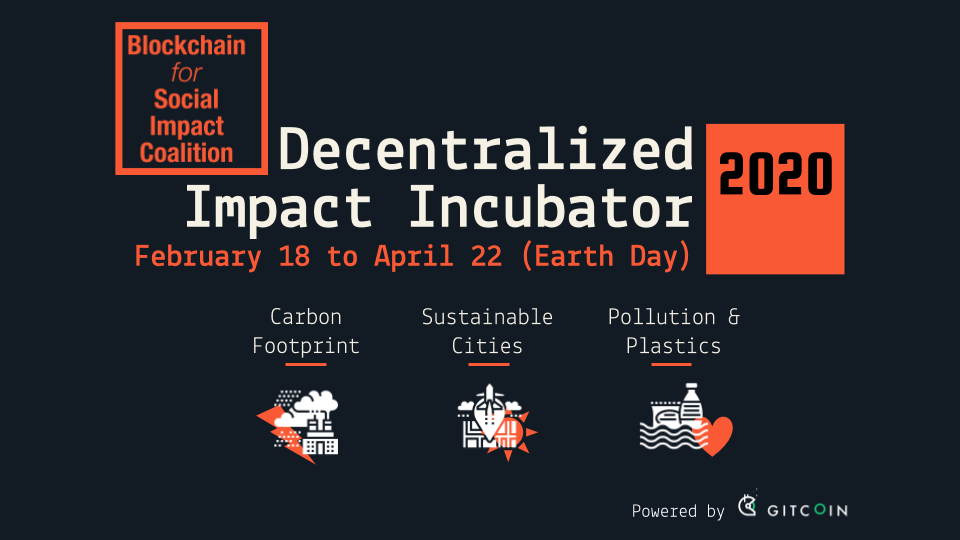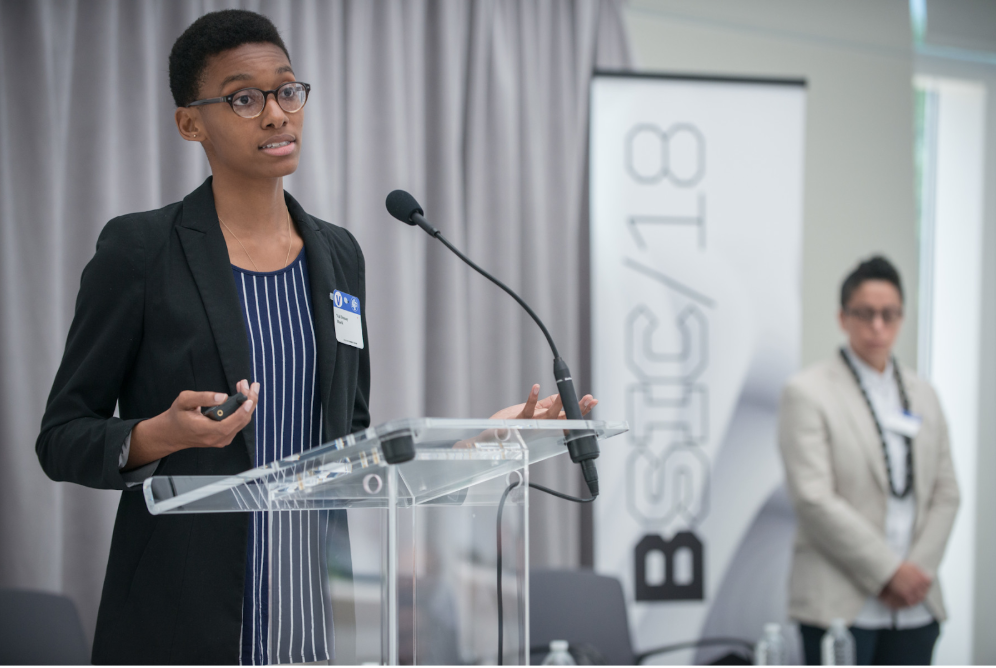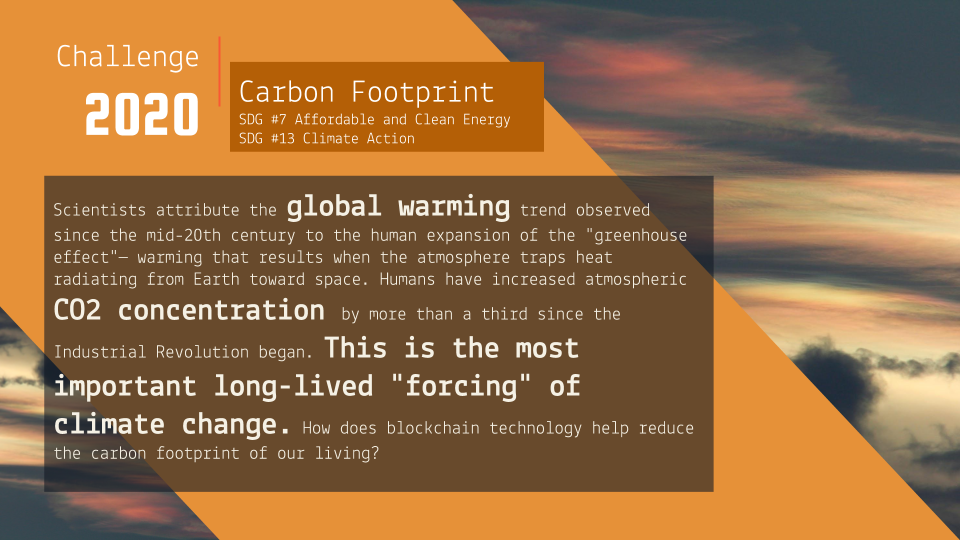BSIC Launches Virtual Incubator to Tackle Global Environmental Issues with Blockchain

Blockchain for Social Impact Coalition (BSIC) has officially launched our fourth annual Decentralized Impact Incubator. During the 6 week online incubator, kicking off Feb 18, 2020 we coach project teams as they ideate, design, build and prototype blockchain solutions to address the United Nations’ Sustainable Development Goals. With a focus on Earth Day participants worldwide are forming virtual teams to compete for prizes, while expert mentors guide their work to completion on April 22nd.
Coinciding with the 50th Anniversary of Earth Day, we are posing three climate-focused challenges: Mitigating Our Carbon Footprint, Designing Sustainable Cities, and Abating Pollution & Plastics. Although the challenges focus on climate change, organizations have the opportunity to sponsor custom challenges that address any SDG of their choosing.
The decentralized impact incubator activates a global community of developers, entrepreneurs, humanitarians, students, and makers, and supports them as they build social enterprises using innovative solutions to address some of the world’s most pressing issues.
The Incubator has in past years attracted over 1,200 participants from more than 120 locations and focused on solutions for reliable hardware, mechanisms for democracy, sustainable agriculture, and support for refugees. Winning projects, many of which are still active, including Nori, a 2017 Energy and Environment winner on a mission to reverse climate change by removing enough carbon dioxide from the atmosphere; Arcadia, a runner-up of 2018 Refugees category and winner of One World Award building p2p marketplace for NGOs and aid agencies, and many others.

Winning teams of this year’s Impact Incubator will split up more than $50,000 in total prize value and have the opportunity to pitch their solution in front of major impact investors and NGOs at the Blockchain for Social Impact Conference. Participants have access to over 100 mentors and judges with expertise in business models, sector knowledge, technical, legal, finance, policy, research, project management, UI/UX design and beyond. Participants from around the world have been gathering to form teams, target use cases, design business models, define impact metrics, and preparing to code their solutions within the scope of the four challenges.
Challenge: Mitigating our Carbon Footprint
- SDG Goal #7: Affordable and Clean Energy
- SDG Goal #13: Climate Action
Since the start of the first industrial revolution, humans have released more than two trillion metric tons of greenhouse gases into the atmosphere. We have created more carbon than nature can absorb, and the excess carbon heats our planet. Already, we have increased our planet’s temperature by 1 degree celsius. If we don’t curb emissions and temperatures continue to climb, the future will be catastrophic. Using technology, we hope to design tools that can negate our carbon emissions. How can blockchains combat climate change? Past Incubator particiapants like Nori are developing virtual marketplaces that incentivize carbon removal. In this challenge, design your own climate solution using blockchains.

Challenge: Designing Sustainable Cities
- SDG Goal #11: Sustainable Cities & Communities
The number of people living in towns and cities has grown more than fivefold since 1950. Cities consume 80 percent of energy production worldwide and account for a roughly equal share of global greenhouse gas emissions. Many cities struggle with environmental degradation, traffic congestion, and inadequate urban infrastructure. City citizens all over the world deserve better basic services, including access to clean water, sanitation, and waste management. How do we design and build cities of the future that sustain the well-being of people, economies, and our planet? How can we breakdown the structural racism built into our economies and cities as we invest in sustainable infrastructure? In this challenge, nonprofits like Reinvestment Fund are prompting you to build tools that assist cities with carbon-neutral blight removal and equitable contracting.
Challenge: Abating Plastics & Pollution
- SDG Goal #12: Plastic and Pollution
Much of the planet is swimming in discarded plastic. Every year, about 8 million tons of plastic waste escapes into the oceans from coastal nations. That’s the equivalent of setting five garbage bags full of trash on every foot of coastline around the world. Plastics often contain additives making them stronger, more flexible, and durable. Many of these additives can extend the life of products if they become litter, with some estimates ranging to at least 400 years to break down. How might blockchain be used as a part of your solution to reduce plastic waste? Bounties Network piloted Bounties for Basura in 2019 to incentivize plastic removal from oceans by directly paying workers on the ground in Manila for their contributions to cleanup and recycling.
Challenge: Custom Challenge supporting Earth Day
To provide flexibility we have custom challenges from some organizations that addresses a sustainable development goal. For example, the City of Austin is sponsoring multiple challenges for a digital identity wallet they are building for people experiencing homelessness in the city. These challenges address SDG #10 Reduced Inequality. Which SDG are you passionate about?
Get Involved
By engaging teams of socially-conscious developers, and connecting them with successful industry leaders, we hope to foster a culture of social enterprise in the blockchain community as it continues to grow. Our previous incubators have attracted over 1,200 participants from more than 120 locations and focused on solutions for financial inclusion, supply chains, identity and vulnerable populations, and energy and environment. Winning projects, many of which are still active, included a medical data management platform, a global giving and crowdfunding platform, immutable evidence management, and a carbon removal marketplace. This year, we hope to continue to grow and support innovators addressing the most pressing needs of our time.
Join 100s of Developers Apply Here! (Deadline February 18)
- Incubator teams are limited to a minimum of 3 participants and a maximum of 4; gender diversity is strongly encouraged.
- Incubator teams must include a minimum of one developer and one individual focused on strategy, impact or business.
- Developers are encouraged to apply both individually and as a team. If you don’t have a team and are selected to participate, you will be able to form a team through our platform.
Join over 70 Mentors Apply Here! (Deadline February 18)
- Mentors should either have a solid technical background and experience building on or using one of the aforementioned blockchains OR extensive international development and / or strategy experience.
- Mentors advise teams before and during the virtual incubator.
- Mentors are expected to attend the assigned office hours and / or be available online to respond within the day.
The Ethereum blockchain has a robust set of tools… See our post on Resources
_________________
Sign up here to participate in our Decentralized Impact Incubator
Sign up Here to be a Mentor
- Mentors should either have a solid technical background and experience building on/using one of the aforementioned blockchains OR extensive international development and/or strategy experience.
- Mentors will advise teams before and during the hackathon.
- Mentors are expected to attend the assigned office hours and/ or be available online to respond within the day.
DO YOU HAVE AN ETHEREUM DAPP OR SOLUTION WE SHOULD USE FOR THE HACKATHON? Contact Us to Become a Tech Partner or Support, Sponsorship packages are available.